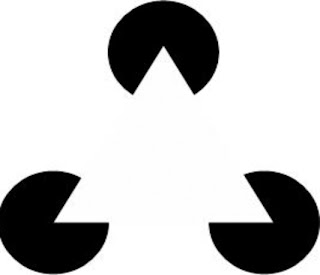Reification
is formed by a conjunction of the latin terms res, meaning
"thing" or "material", and the suffix -ification, from the
latin ficare meaning "to make" or "to become". The term itself has been incorporated into the technical
language of a number of different fields, acquiring new meaning within each
context.
In Gestalt
psychology, a movement founded on the premise that we perceive whole entities
before we perceive disparate parts, reification refers to the constructive
aspect of visual perception. This aspect causes us to interpret forms beyond
those of the actual stimulus. In the example below, rather than perceiving
three separate figures we interpret from them a triangle where it is neither
outlined nor filled in with a tone or colour. Advances in the study of illusory
contours revealed that we perceive these implied contours as "real".
The Oxford Dictionary of Sociology defines reification as
"The error of regarding an abstraction as a material thing, and
attributing causal powers to it—in other words the fallacy of misplaced
concreteness." If we consider a statement such as "If the government
refuses to put this stimulus package into action, the nation will run out of
fuel and stop dead in its tracks" we find an example of this fallacy. The
person making this statement is arguing the urgency of a certain action on the
premise that "the nation", itself a concept, is no different from a
vehicle, something concrete, and therefore can be treated as such. In political
rhetoric this may be taken as a metaphor used knowingly in an attempt to
persuade an audience. To accept this as reasonablr the audince must either assume
the speaker understands the concept they are describing on a deeper basis than
the metaphor, or commit the fallacy of the argument themselves.
The Oxford
Dictionary of Media and Communication defines reification as
“a representational practice which functions to establish the
self-evident reality of the concept in question, treating it as if it has the
ontological status of a specific physical thing in an objective material world.
Reification suppresses the human intervention involved in the defining process
as if the signifier were neutral and had been an integral part of a
pre-existing thing in the world.”. In essence, this says that reification takes
place when a concept becomes taken for granted as an actual thing. It goes on
to give supporting examples including the mind, technology such as television
and computers. Carrying on this idea, our acceptance of corporations as actors
or entities in our daily lives might also be considered reification.
Bibliography
1. Scott, John,
inasdf and Gordon Marshall. "reification." In A Dictionary of Sociology, Oxford
University Press. (, n.d.). Retrieved 25 Nov. 2012, from
http://www.oxfordreference.com.proxy.lib.uwaterloo.ca/view/10.1093/acref/9780199533008.001.0001/acref-9780199533008-e-1906
2. "reification."
In , . (, n.d.). Retrieved 25 Nov.
2012, from
http://www.oxfordreference.com.proxy.lib.uwaterloo.ca/view/10.1093/oi/authority.20110803100412880
3. Joffre
Essley, . House Design Coffee, "Gestalt Laws." Accessed November 25,
2012. http://www.house-design-coffee.com/gestalt-laws.html.

No comments:
Post a Comment